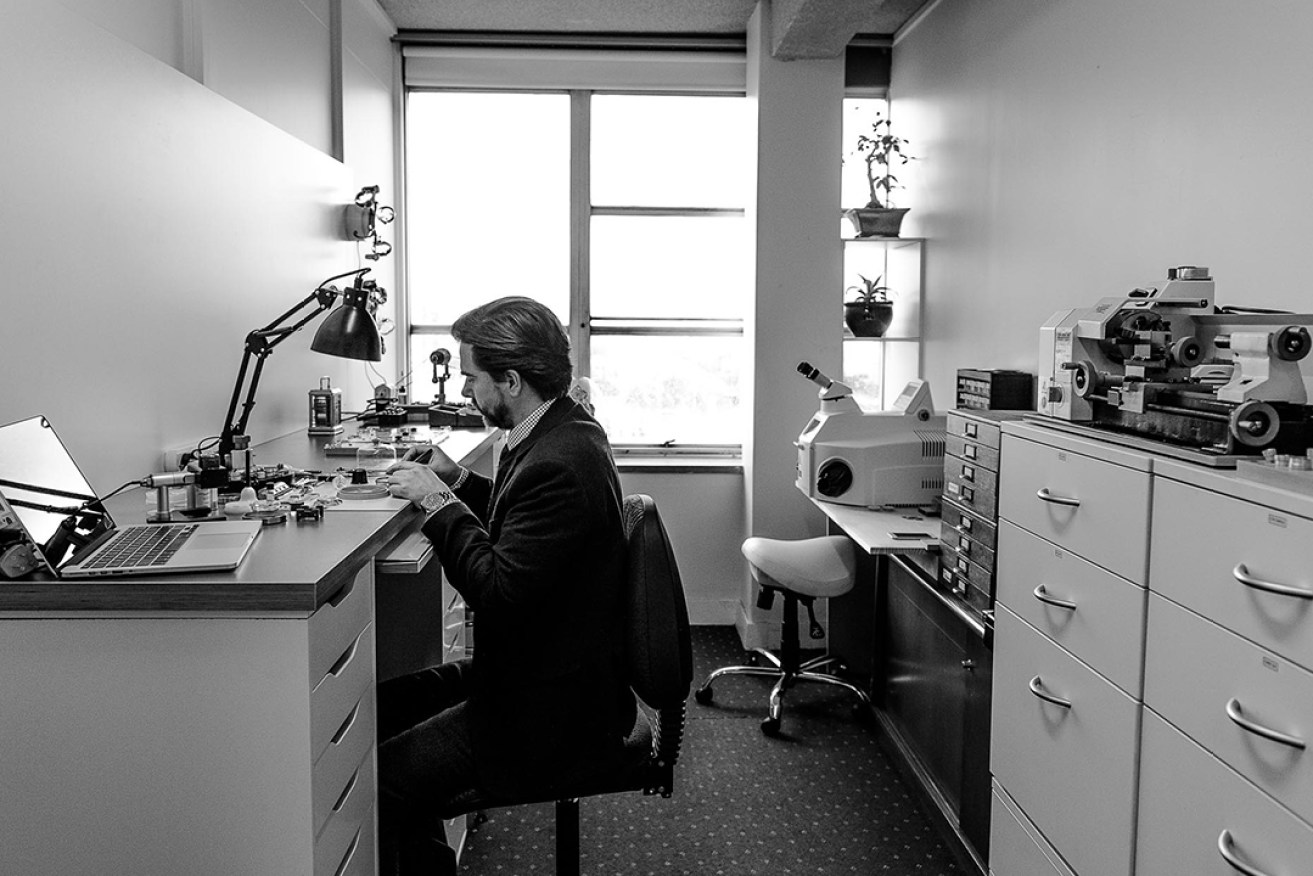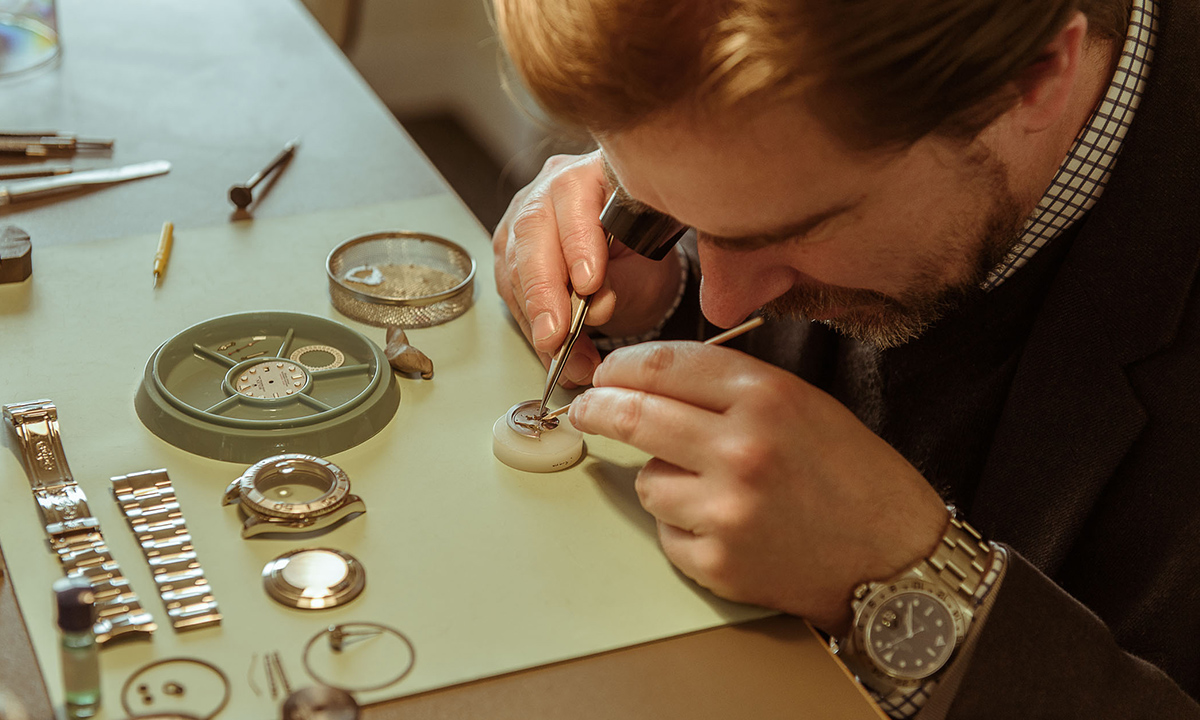10 minutes with… prestige watchmaker Richard McMahon
For three decades, watchmaker Richard McMahon has been repairing and selling the world’s most prestigious watch brands. He talks to InDaily about the growth in the luxury watch market and how he makes his business work from an Adelaide base.


Richard McMahon at work in his Adelaide offices. Photo: Sven Kovac via CityMag
InDaily: What is the state of the prestige watch market in Australia at the moment? Has the smartwatch trend had any impact or are they essentially different categories of items?
Richard McMahon: The new and second-hand market trend is still increasing year on year since GFC times. In fact, some new watch manufacturers have waiting lists for some products going out five years. This has had a very large impact on the luxury second-hand market which is our specialty. Some models of second-hand watches have doubled in price over the last five years. I was reading recently the best investments that people could have made in the last decade are vintage watches and cars.
The smartwatch trend as I have read in recent reports is about to eclipse mechanical watches in value world-wide. These are really more of an electronic product with extra functionality, that complements your mobile phone or as a fitness accessory – it really hasn’t made a dent in the luxury wristwatch market.
Can you tell me which brands you specialise in and the challenges in working with prestige global brands?
We specialise in Omega, Rolex and Breitling repairs and restoration. We stay away from modern fashion brands: if the company hasn’t been around 100 years, we’re not interested. There is no spare parts support for so many new brands that have started in the last few years.
Parts supply has become more difficult in recent years. R. McMahon Watchmakers have spent a lot of money and time building a first-class international standard workshop. Times have changed, and if you don’t spend hundreds of thousands of dollars on your workshop, there is no hope of keeping up with the requirements for servicing high-grade watches and restoration of vintage pieces. In October last year, our restoration centre was inspected by Swatch Group (Omega) and we are one of only two workshops in South Australia allowed to purchase spare parts and attend training workshops in Melbourne.
Why do you love working in this field?
I love the mix of technology, the amazing history of watch development and the beauty of mechanical watches. Restoring an Omega or Rolex that may not have worked in decades is very satisfying.
I’ve been in the trade over 30 years and couldn’t imagine doing anything else.
Is there any part of your business that is showing more growth than any other? If so, can you expand on what might be driving that?
Recently the interest for vintage watches among people aged 20–30 years old has increased a great deal. Restoration has always had a steady increase.
Also, the investment opportunity, as vintage watches – particularly a few brands – become more difficult to find, it seems to have a snowball effect in the market.
What are the challenges to maintaining a skilled workforce in your highly specialised area?
To become a qualified watchmaker takes four years, including training at TAFE in Sydney. To become a restorer in the high-end market takes a minimum of 10 years. It’s a big investment in training and staff development – there are only a few spots per year for training opportunities in Australia. There is a worldwide shortage of fully qualified watchmakers – this has been the case for 25 years.
Is Adelaide as a location for your business significant – ie how much of your trade is local, and how much from elsewhere? Is your online presence increasingly important?
I grew up in Adelaide and completed my watchmaking apprenticeship in 1994. I worked in Sydney for nine years, London for three and then various places in Europe, before settling back to my hometown setting up my restoration centre and vintage watch showroom. Approximately 80 per cent of my business is local, 10 per cent interstate and 10 per cent overseas.
When it comes to online presence, if you don’t have a well developed Facebook, Instagram and website, you don’t exist. I spend 0ver 15 hours a week staying on top of it.
If you have a great service or product, you have to work hard at it and not be complacent.
Before social media and the internet, it would have been impossible, but Adelaide has so many benefits that make it an attractive place to build a business. I can’t see why more businesses don’t come here: it’s a fantastic city to live and grow up in. I do find a lot of Adelaide locals are negative about the place, but if you’ve lived in other cities long enough, you miss what we have in Adelaide.

What can the community, or the State Government, do to convey that message about the ease of business here – to attract more business people to relocate or stay here?
Adelaide is a pretty central city – only a few hours to Sydney and Brisbane, and Melbourne is so close. We find many costs like rent are a lot cheaper in Adelaide. We use couriers a lot, and for very expensive watches, customers fly to us in Adelaide or I deliver them personally.
I can’t think of any plus or minus benefits of State Government decisions for us in Adelaide – really all changes or benefits are federal matters. It’s big-picture financial issues that seem to be important to us and from what some of my clients are saying.
As a community, it has been great seeing how many young people are opening up businesses. Things like high-speed internet initiatives seem to be attracting tech and defence companies to Adelaide. These seem to be more local council or private business-related, not as much State Government initiatives.
When it comes to what government can do to help business, I’d say interfere as little as possible. I think Australia has too many layers of government – they should just help create an environment to give consumers confidence. People contributing tax through spending is a good thing for everyone.
Given you’re dealing in a premium product, how important is the general economic environment to your business? How do you work with that dynamic?
My personal experience over the last 30 years is that in restoration/repairs, there is plenty of work around for us. At the end of last year and the start of this year, sales fell very flat, but we have a lot of repairs to keep us flat out.
How is business now, in the post-election environment?
I have to say our last eight weeks have been the busiest in premium watch sales we’ve had in a while – I’d say double over last year, particularly in customers in the 40 to 60 year age groups. The consumer confidence in our sector has made a huge bounce back. It has given our clients more confidence and they seem willing to spend again.




